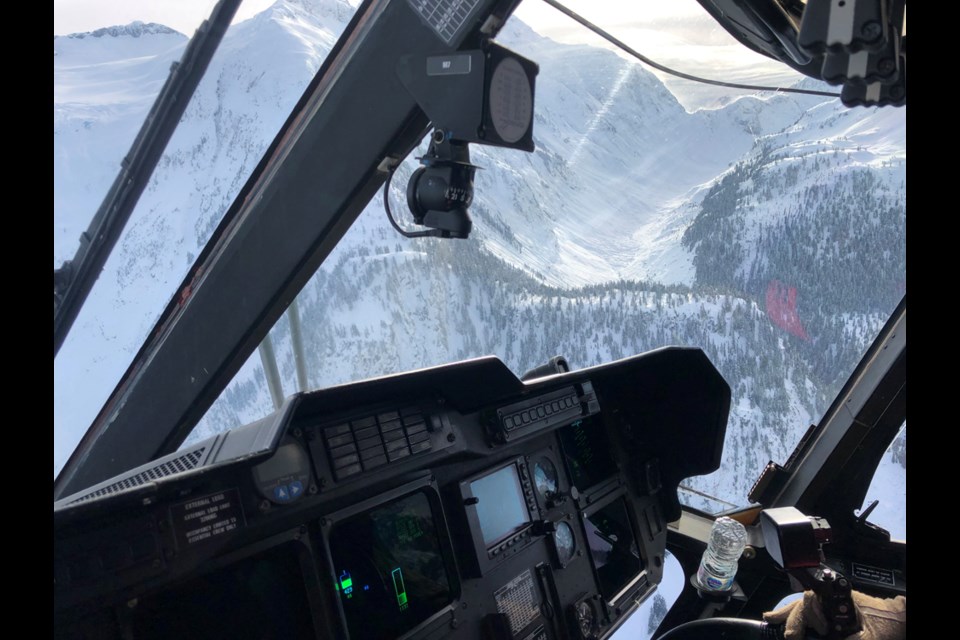Two skiers from Squamish are fortunate to be alive after being rescued by CFB Comox's 442 Rescue Squadron on Thursday afternoon (Feb. 11).
Squamish Search and Rescue manager Tyler Duncan said the call came in just after 11 a.m.
The men were at the back of Mamquam Mountain in the Super Couloir area, two kilometres northeast of Mamquam Lake at the south end of Garibaldi Provincial Park when one badly hurt his leg.
Duncan said SAR planned to follow up the day after the rescue to gain a clearer picture of what happened, but noted that the injured skier was caught in an avalanche.
"To the best of our knowledge, one of them was caught in … an avalanche that washed them down the couloir," he said. "In the process of that, he probably fractured his leg and obviously, with a fractured leg, he was unable to ski out of the area and needed some help."
Avalanche Canada's Feb. 11 bulletin advised of moderate avalanche risk in the alpine and low risk at the treeline and below.
With winds gusting between 41 and 56 km/h the afternoon of the rescue, Duncan said SAR's pilots were not comfortable flying in order to attempt the rescue, so the organization contacted CFB Comox, whose Cormorant was better suited to the task.
"The Cormorant helicopter was able to better handle the winds, being massive and huge," he said.
A pilot with Blackcomb Helicopters told The Chief in an email that it was deemed not safe to fly its helicopter for this rescue.
"A risk assessment was made looking at current weather, location of the subjects, previous experience in strong outflow wind conditions, and the forecast. The result of that risk assessment and subjective observation was that it was beyond the threshold for safe flight at that time, in that aircraft," said Ben Hawkins, Squamish base manager and pilot with Blackcomb, which often assists with Sea to Sky SAR rescues.
"The recreating public should be aware that, although there are very capable, experienced, well trained and motivated search and rescue teams throughout the province, circumstances can prevail that prevent them from accessing injured or lost persons in time."
There was some delay, Duncan noted, but the skiers were brought to the Squamish Airport before being transferred to Squamish General Hospital shortly before 5 p.m.
Seventeen SSAR members helped with the rescue. Duncan said SAR was exploring a ground rescue option by snowmobile from Brohm Ridge around Garibaldi Mountain through the park before confirming that CFB Comox would try by air.
Duncan noted that the 442 Rescue Squadron is primarily a marine rescue unit, so it was far from a sure thing SSAR's request for assistance would be granted.
"The military helicopter is never a guarantee," he said. "They're very commonly not available because their primary duty is to shipping. Land rescue is not their responsibility. They do it as a favour if they're available."
After agreeing, Duncan noted that considering the winds and avalanche risk, the Comox crew gave a "50-50, we'll-give-it-a-go" answer, and fortunately ended up being successful.
"They're well trained in avalanche terrain, but they're just not equipped to deal with a higher-level avalanche situation," he said. "They don't have avalanche forecasters. They don't have bombs readily available to control an avalanche risk. That was definitely pretty concerning for them."
The two rescued skiers are from Squamish, and Duncan said their preparedness was essential in a dire situation considering the chilly conditions.
"The skiers survived because they were very prepared. In the conditions that are out there right now, this was not a survivable accident if you were not prepared for it," he said. "If they didn't have good gear and the ability to reach out through the satellite, they would not have survived.
"To the best of our knowledge, [they're] very experienced and prepared to be out there. They were camping out there overnight, so prepared to be where they were," he added. "Just a little bit of bad luck."
Find out more about being prepared in the backcountry in winter from BCAdventureSmart here.



